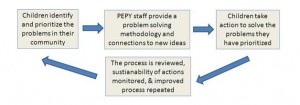Last week I wrote a blog post complaining about volunteer sending organizations trying to “sell” their 17 year old volunteers to NGO organizations. I then got a very well thought out response from 16 year old Naya Herman who is considering volunteering abroad and so I decided to answer her two questions in two new blog posts. Here is the second of two posts.
—
As for your second question, what can YOU do, a nearly-17-year-old, intelligent, worldly, education-seeking, student? Well, there is a LOT you can do. I just don’t think that these “pay to teach English in an orphanage” programs are it. First off, my advice is:
a) Start off by volunteering at home. There is a quote that says something like “We go abroad to stare at the same people we ignore at home.” We have homeless shelters at home, big brother/big sister type programs where you can mentor a younger child who might not have someone as loving and intelligent as you to believe in them, refugee service programs where you can be matched with a refugee family coming in from South East Asia (if that is where your interest lies) and you can help show them the compassion and welcoming feelings you received when you were in Cambodia. There are a LOT of ways to do great things every week at home (libraries to read to young kids in, fundraising projects at school, writing online about the lessons you learned on your travels to share with others, etc).
b) Look into NGOs to volunteer abroad where your skills are needed and/or you can provide support to programs you believe in without going through a profiteering middle-man. At PEPY, we take volunteers for 6 months, but the difference from the typical “Volunteer Abroad” programs is, they usually work in our OFFICE, not with students, not building things, not teaching English in orphanages. Hence, the work seems a lot more “boring” than the “go abroad and change a child’s life” ads some volunteer programs are using. BUT, there are indeed things that someone with your skills could help do at PEPY or elsewhere – and they might be similar to things you would do interning at home in an office such as editing copy in English, reading through and sorting data and English information that our Khmer staff might have difficulties with, donor relations and thank yous, etc. No, not glamorous, but yes, a chance to learn.
When evaluating a volunteer placement I would consider:
1) Do my skills match the stated need? Are you being sent out as a Peace Corps volunteer in “Guatemalan Small Business Development Planning” when you majored in English and have never been to Guatemala? Hmm…. maybe it’s not a great fit?
2) Does the stated volunteer position seem like I will be adding to the sustainability of the organizations overall work? If the core problem the program claims to be solving is English language education, does your short term visit seem like it is a good long-term solution? If instead, you are teaching TEACHERS English to improve their native pronunciation so that they can be more effective teachers in the long-term, that would seem to me to be a slightly better fit.
3) Does the job seem like one fit for a short-term outsider? An organization based in a foreign country and working in a different language than your own will hopefully not place you in a program management position in a community. If they are, you should go back to a) and analyze if your skills match the need. If they are placing you in an administrative or support position, see if yours is a role that would make sense for an outsider to do. Could a local person fill your role? If your role is editing English copy in grant writing proposals, perhaps it is a good fit because you are able to add value through a skill you have, you would have the chance to teach the long-term staff how to improve their work, and if there is no one there to fill your role once you leave it is still possible for the organization to continue on and be successful, with perhaps slightly less editing support.
4) Where is your money going? If you are paying a “fee” to volunteer, whose salaries are you paying? Are you paying for a UK office of a volunteer sending program? If so, consider if the value they have provided is worth the fee you are paying. Do they seem like they are “selling” you something or are they taking the time to honestly answer your questions and guide you to a fit that is best for you? Is the local partner paying to have you there? If so, do you think the value you are able to provide is worth the money they are paying to have you, or would their funds be better spent on their programs? These are questions you will need to answer based on each individual case.
I hope this is helpful! If there are others out there reading this, I’d love to see comments with additional thoughts or other advice you would give a young person looking to volunteer!




